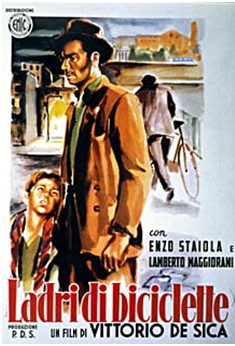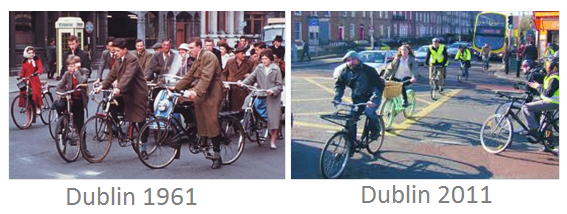
Bike theft in Dublin – an underreported and growing problem
 Despite all the progress on cycling issues over the past few years, one area where there have been few success stories is in the reduction of bike theft. With the sharp growth in bike theft figures in Dublin over the past few years, David Timoney said he would look into the issue on behalf of the Dublin Cycling Campaign and come up with a plan of action.
Despite all the progress on cycling issues over the past few years, one area where there have been few success stories is in the reduction of bike theft. With the sharp growth in bike theft figures in Dublin over the past few years, David Timoney said he would look into the issue on behalf of the Dublin Cycling Campaign and come up with a plan of action.
Unfortunately, while meeting a member of the City Council as part of his research, he became part of the 2014 statistics. To have one’s bike stolen when in a meeting about the very same issue... “The irony of it!” he says. “I could say that this was all part of a plan to totally immerse myself in the project, but really it was just that I had a cheap cable lock that day...” Dublin cyclists, be warned! It could happen to you. Chances are it already has. David Timoney investigates.
Bike theft is an old problem
While these days the consequences of having one’s bike stolen aren’t as serious for most of us as was the case in the Italian film “Bicycle Thieves” (Ladri di biciclette), it is a real irritation for cyclists, and as we’ll see it’s a seriously underreported problem. (In the film the young father has his bike stolen while erecting posters in post-war Rome. Needing his bike for the job, he is now unemployed and scours Rome for the bike thief.)
Background - Dublin is again becoming a cycling city
Like many cities, Dublin’s cycling heyday was in the 50’s to the 70’s, followed by a steady decline in the 80’s and 90’s, and finally a recovery beginning over the last 10 years.
Cycling in Dublin has almost doubled in the past years driven by a number of factors including improved bike facilities, a tax-relief scheme for the purchase of new bikes and an increased focus on fitness and health. The economic recession has also played a big role in getting people to use a more cost-effective means of transport. There is some bad news however, as we’ll see, bike theft has more than kept up with the increased bike usage.
Bike theft, or fear of theft, is a potential barrier to people taking up cycling which needs to be removed if we are to reach our goal of increased usage of this sustainable form of transport.
Bike theft data
Bike theft in Ireland is predominantly a Dublin problem with about 75% of nationally recorded thefts occurring in Dublin. While bike usage in Dublin has increased significantly over the past 10 years, (+92%), reported bike theft has increased at a faster rate (+126%), as can be seen in figure 1.
But these numbers underestimate the true level of bike theft. Crime Victim Surveys consistently show that the actual number of bike thefts is far higher than the reported thefts. Taking Ireland, UK, Netherlands and Denmark as examples it shows that the rate of underreporting varies between about 6:1 in Ireland & the Netherlands to 5:1 in the UK and about 4:1 in Denmark. Based on the above figures from the crime victim surveys, the real level of bike theft in Dublin would rise up to 17,000 -26,000/yr rather than the 4k reported thefts.
Conviction rates for bike theft
The conviction rates for bike theft are extremely low in Ireland with official figures showing about a 2% conviction rate. This is based on recorded thefts but when we factor in our estimated number of thefts based on crime victim surveys, the conviction rate falls to about 0.5%, or about 1 conviction for every 200 stolen bikes. With even the most conservative estimate showing that only 1 in 50 thefts result in a conviction, it is safe to say that deterrence is not being used to its potential.
Learning from abroad: the Dutch case study
In 2006, the newly elected Dutch government decided to tackle bike theft and set a goal of a 100,000 reduction in theft by 2010 compared to the 2006 base year figure of 763,000. Crucially, these figures were based on estimated thefts from crime victim studies not reported thefts to police. The main findings from the study were twofold: the booming nature of the stolen bikes market and resigned public attitude towards bike theft. Indeed, a thriving market for stolen bikes existed with both adequate supply and demand. Stealing bikes was a profitable and low-risk activity. This was combined with complacent attitudes: both the general public and the police felt that there was little that could be done about it.
This called for the creation of an action plan, whose ambitions were the following:
(1) a reduction in the opportunities for stealing bikes
(2) a change in the attitude of public and police to bike theft and
(3) the introduction of a bike register
To support the plan and to launch the bike register, a major public awareness campaign was carried out in 2008. The main points of the campaign were:
- Always lock your bike, use 2 locks and attach it to an object
- Know what you own (frame number, type, photo)
- Always report theft to police
- Don’t buy a stolen bike
By 2010, bike theft had fallen by 1/3rd. This represents a staggering 250,000 reduction, all the more impressive when compared to the original 100,000 target.
The Dutch agencies involved in the project say that there are a number of factors required for a successful outcome. Most notably, that all stakeholders are involved in the plan (police, justice, councils, distributors, shops, cyclists organisations etc), that there is a state-run bike theft steering committee, and, most importantly, that there is political will to take action.
Plan/next steps for Dublin
While recorded car theft in Ireland has fallen by 49% over the period 2004-13, with technical improvements in vehicle security likely to be at least partly responsible for the fall, there has been no corresponding technical solution as yet for bikes. Such a technical solution ought to reduce the incidence of theft. In the short-term then, the most important point is for bike owners not to become an ‘opportunity’ for bike thieves. That means taking more responsibility for bike security by using better quality locks – even if this means using two different types of locks, such as a ‘U’ lock and a chain and padlock). Bike shop owners have suggested that people buying bikes should spend €50 less on the bike and reinvest that €50 on your lock, in addition to what you had planned to spend.
To further support the argument for a “2 lock solution”, I would like to share a short anecdote. A friend recently came across an individual in Dublin stealing a bike. While not risking to intervene to stop the bike being taken, my friend did enquire as to what was the best way of not getting one’s bike stolen. The chap looked up, considered the question and gave a two-word reply, and not the 2 word reply I was expecting: “Two locks” he said, before returning to the task in hand.
In the longer term, Dublin can work on getting a more sophisticated system in place including:
- Bike theft register run by the state to encourage reporting, to make it easier for police to re-unite stolen bikes with owners and to deter thieves and buyers and sellers of stolen bikes.
- Bike Parking including bike parks & on street stands.
- Permanent state run anti-bike theft body.
- Information campaign to communicate best practice on bike security and to encourage cyclists to know their frame number and to report theft.
Conclusion
Bike theft is an old, and in Dublin, growing problem. Initial research indicates that there is no simple solution or ‘silver bullet’ that will solve the issue. In the short-term however, the Dublin Cycling Campaign aims to get agreement from the city authorities to set up the co-ordinating committee on bike theft and to push for extra bike parking facilities. Dublin Cycling Campaign plans to contact cycling groups in Europe that have experience of working on anti-theft strategies and in particular bike registration schemes. The ultimate aim is to have a central point for knowledge and expertise on the subject, possibly hosted by the ECF. Finally, we aim to run an information campaign in Dublin to educate the public on bike security, so that, unlike me, they don’t become a statistic.
David Timoney is part of the Dublin Cycling Campaign and has been investigating bike theft in his city for several years. If you have knowledge, experience or simply an interest in anti-bike theft strategies, please contact davidtimoney@yahoo.com
- Log in to post comments
Contact the author
Recent news!
Upcoming events
Contact Us
Avenue des Arts, 7-8
Postal address: Rue de la Charité, 22
1210 Brussels, Belgium












